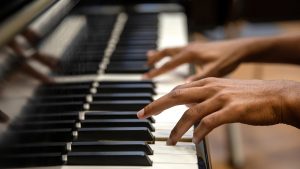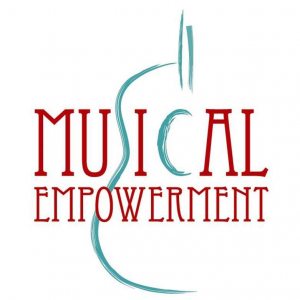Led by Carolina students, Musical Empowerment provides one-on-one music lessons for nearly 130 underserved children in the Chapel Hill and Carrboro community.

For Abigale Hawkins, music and service have always been intertwined. Performing has been her way of giving back to her community.
As a member of her church’s youth choir growing up, she performed at homeless shelters and even sang alongside a choir at a women’s prison.
“I’ve always had music and service in my life, and I really wanted to make sure that I was using my gift and my talents to give back,” said Hawkins, a Carolina senior double majoring in business administration and music. “When I got to college, I didn’t want to stop using music and service together.”
Hawkins found her way to combine those passions when she came across a table for Musical Empowerment at FallFest during her first semester. The student group organizes and hosts free music lessons for children in the Chapel Hill and Carrboro community.
Now the co-president of the organization, Hawkins helps lead the organization of 130 Tar Heels who teach and mentor 130 local students every week.
Learn more about Music Empowerment and its work in the community from Hawkins below
What is Musical Empowerment’s mission?
Musical Empowerment provides free one-on-one music lessons to underserved children in the community. We pair a teacher, who is an undergrad student at UNC, with a K-12 student in the community. We also have an instrument lending program where we collect donated instruments from around the community, and we lend out those instruments to our students because that’s expensive — the instruments.
Our mission is to provide children with not only a place they can go and learn about music and learn about an instrument that they’re really interested in, but also a place where they can go and get to know a mentor. We really emphasize the mentorship aspect of the student-teacher relationship.
I think a lot of us who teach the music lessons have had someone in our life who has been a mentor to us through music. I know for me personally, my voice teacher when I was in high school, I was really close to her and just loved all the things she did with me and the advice she gave me. She was really a role model for me. And so, the ability for us to provide that to children in the community is really meaningful to not only me, but I believe all of our other teachers in the program.
There are many ways to get involved in the community. Why have you chosen music as your platform?
I just think music is such a creative outlet and a space where you can do something that you truly love and are interested in. You can find shared interest with your teacher. Music is just a powerful thing and a powerful tool that helps connect everyone. I definitely think it’s really cool that we get to have this relationship with them through that tool for creativity and connection.
How has the pandemic change the way the organization operates? Why was it important for you to find a way to continue teaching?
Before COVID, we had all our lessons in-person. When COVID hit, we had to do this big transition onto all online. Now we’re doing a hybrid situation.
One positive of COVID is that it has allowed more teachers and students to participate in the program because sometimes it’s hard for parents to drive their children to where we’re holding lessons. Logistically, it can just be easier. And I think it’s providing more opportunities for people to get involved, which is exciting.
I think that the children that we serve —and the teachers, too — just needed that sort of light in the middle of their week to give fun music lessons and chat about music and just what’s going on. I know my student sometimes would come to lessons asking me some tough questions about COVID and what’s happening, and I’m just glad that I could be there as a space for her to communicate those feelings to me. I really feel like mentorship shines during that part because it’s hard to give a music lesson virtually because of lag time and that kind of thing. I feel like it gave us a good opportunity to really home in on that mentorship aspect.
What has been your favorite part of being a member of Musical Empowerment?
My relationship with my student. I remember when we first started, I was so nervous for our first lesson, and I was like,” Oh my gosh, I hope she likes me,” and that kind of thing. And we just have gotten really close over the years. I love seeing how she has grown both musically and how much she’s grown just in her confidence in general over the years. So that’s definitely humbled me. I honestly feel like she’s teaching me more than I’m teaching her at this point, just with how great she is and what it’s been like to see her grow.
Learn more about Musical Empowerment and how to get involved
